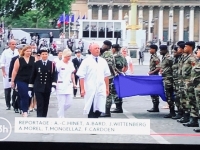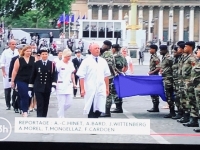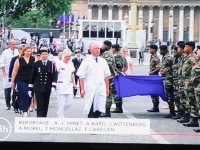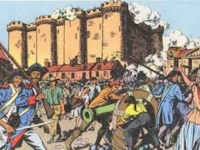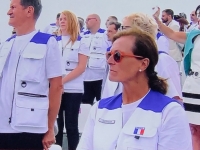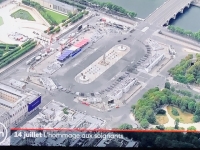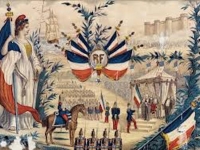Politics
EXCEPTIONAL JULY 14 FRENCH NATIONAL DAY AS HEALTHCARE STAFF AT WORSHIP
MILITARY PARADE TRIBUTE OVER COVID-19
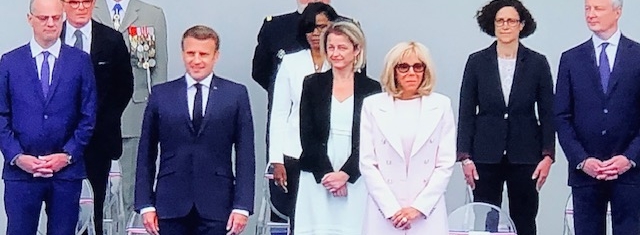
Pdtt Emmanuel & Brigitte Macron Ceremony July 14th (Source: TV caption Tf1 tv France 2)
USPA NEWS -
The French national holiday, took place this July 14 in a new format, very reduced, without spectators on site, due to the COVID-19 pandemic. This morning, the traditional military parade in Paris, takes place almost without public. President Emmanuel Macron had so far refused the traditional July 14 interview, imposed by Valery Giscard d'Estaing. But this year, he will answer questions from two journalists in a particularly tense context.
The French national holiday, took place this July 14 in a new format, very reduced, without spectators on site, due to the COVID-19 pandemic. This morning, the traditional military parade in Paris, takes place almost without public. President Emmanuel Macron had so far refused the traditional July 14 interview, imposed by Valery Giscard d'Estaing. But this year, he will answer questions from two journalists in a particularly tense context. The government announced a few weeks ago that the 2020 National Day celebrations were be dedicated to everyday heroes during the coronavirus crisis. This unusual format was announced and decided by the FrenchPresident Macron, under the slogan : "A committed, united and united nation". given the COVID-19 epidemic period, the event, which usually brings together almost a million people, was not open to the public, but broadcast on television. In the stands, there were only 2,500 guests, of whom 1,400 represented the French on the front line during the epidemic, namely caregivers, families of caregivers who died from COVID-19, teachers, cashiers, funeral officers, police, gendarmes, firefighters, and employees of mask or test factories. The Head of State thus wanted to put "in the front line" of heroes of confinement alongside the military in line with his approach "We are at war against an invisible enemy COViD-19.The ceremony ended with a larger tribute to the caregivers, to the sound of the Marseillaise. The Patrouille de France made an exceptional second visit in their honor.
PRESIDENT MACRON PRESIDED THE JULY 14TH CEREMONY WITH HIS NEW GOVERNMENT
In a message published Tuesday morning, Emmanuel Macron said:
“On this July 14th (“¦) I wish, with all the French, with the armies themselves, to pay a vibrant tribute to the health personnel and to those who, in all sectors, have enabled public life , social and economic to continue. "
Each year, the French celebrated the national holiday on July 14, with the parade of the Champs Elysees, each year welcomes thousands of participants, facing a presidential platform at Place de la Concorde. It is one of the most republican and popular festivals and traditionally celebration of the French army in the presence of the President of the Republic, and the elites of the French army and the regiments of French soldiers, on a theme that changes each year, with exceptional holdings.
This year 2020, in the midst of the COVID-19 pandemic, the President of the Republic Emmanuel Macron decided to mark this national holiday with a special tribute to the caregivers of the heroes of the epidemic.
HISTORY OF THE FRENCH NATIONAL COMMEMORATION OF 14 of JULY (Source Elysee)
Each year since 1880, the Republic celebrates the Nation in the middle of July. What does she celebrate exactly? How was the day chosen? What are the issues ? It is built on the memory and the significance of two revolutionary events which place the people at the heart of the action, both actor and object, subject and purpose. However, the facts carry their own history and interpretation, and make the collective memory around July 14, a reconstruction.
On July 14, 1789, the storming of the Bastille, from event to myth.
The rise to the rank of founding event gives July 14, 1789 a special place in the national memory. Revolutionary event or revolt of the Old Regime? The Bastille occupies a special place in the popular imagination which contributes to the very nature of the event and its interpretation. Fortress, prison symbol of royal arbitrariness in matters of justice, militarized fortress turned towards the capital, place of potential revolt, in particular the Faubourg Saint Antoine, place of the least confessable torments of which would have been victims of unidentifiable condemned persons both in number and in number 'in name, dying without possible return to the society of men, symbol of tyranny, the list is long of the characters of this bastion erected from King Charles V and which had long lost its prison status. When the fortress was conquered or simply surrendered following the surrender of its garrison, the people of Paris apparently only found seven prisoners there, including four forgers.
The event actually had two successes: one meets the objectives of the people who came to besiege them, the other to their posterity. The event is a popular reaction to the situation of fear caused by the presence of troops around the capital. The people of Paris form a fairly substantial militia estimated at more than 40,000 men. On July 12, a Sunday, the dismissal of Necker was known to Paris, which went into turmoil, not out of sympathy for the minister, but out of fear of a return to force of royal authority. Camille Desmoulins harangues the crowd at the Royal Palace to encourage them to defend themselves. Spontaneous demonstrations in the streets support Necker and the intervention of a German regiment in the Tuileries leaves wounded. The food concerns of the city maintain fear, emotion in the modern sense of the term. The next morning, very early, the gates of granting were set on fire, the Saint Lazare convent was looted because it was suspected of harboring grain. At the Hôtel de Ville in the morning, voters from the city of Paris led by the provost of the merchants, Jacques de Flesselles, created a standing committee and a militia, with the distinctive sign of a red and blue roundel, colors of the city . But this militia is not armed: places where weapons are held are looted, pikes are forged. Request is made to the Governor of the Invalides to deliver arms: he refuses.
On the morning of the 14th, the crowd went to the Invalides to demand access to arms. The troops present on the Champ de Mars make it known that they will not march on the Parisians who then seize the Invalides, find there thirty thousand rifles and twelve cannons. Only the powder and the bullets are missing. A first and then a second delegation of voters from the city of Paris are received by Governor Launay at the Bastille but do not get powder or bullets, while at the end of the morning the crowd begins to mass in front of the fortress. Around 1:30 p.m., the defenders of the Bastille, invalids, responding to Launay's orders, opened fire on the crowd for the first time. A third and a fourth delegation went to the Bastille without more success. From 3.30 p.m., five cannons taken in the morning from the Invalides are placed in front of the Bastille by French guards. Around five p.m., the garrison of the Bastille surrenders with the promise of being well treated, the crowd seizes the Bastille, takes the powder it had come to seek and frees some prisoners. A hundred Parisians were killed during the day. On the way to the Town Hall where the garrison now imprisoned must be taken, Governor Launay is killed, his head cut off with a penknife by a young butcher, the provost of the merchants is also murdered on the grounds of treachery, the archives of the Bastille are pillaged. In a macabre dance, the heads are walked through Paris to the Palais Royal. At the end of the day, still ignoring the episode of the capture of the Bastille, Louis XVI ordered the withdrawal of the troops. The king only learned of the event when he woke up the next morning, the Duke of La Rochefoucauld-Liancourt left this word that had become famous "No, Sire, it's a revolution" ...
Since 1980, the Champs-Élysées has once again become part of the parade. July 14, 1989 was a highlight of the bicentennial of the French Revolution. Many foreign heads of state were able to attend in particular "the Marseillaise", spectacle of Jean-Paul Goude.
1994: Eurocorps, symbol of Franco-German reconciliation
On July 14, 1994, Eurocorps took part in the French National Day parade on the Champs-Élysées in Paris. For the first time since the end of the Second World War, German soldiers parade in France, under the sign of Franco-German reconciliation operated within the European framework.
In 2007, soldiers from 27 European countries marched for the first time. In 2009, the Republic of India was the guest of honor at the July 14 ceremonies. The military parade is opened by a detachment of 400 officers, non-commissioned officers and soldiers from the Indian Army, Navy and Air Force. In 2010 fourteen African countries, which have been associated in their history with France and which celebrated this year the fiftieth anniversary of their independence, were the guests of honor at the ceremonies of July 14. Source: Texts produced in collaboration with the National Center for Educational Documentation (CNDP) - Pierrick Hervé In 2007, 2008 and 2009, hundreds of anonymous "heroes" and "victims" were invited to the reception which is traditionally held in the park of the Palais de l'Éysée after the parade. In 2010, Nicolas Sarkozy decided to abolish the "garden party" in order to testify to the Elysée's effort in favor of the good management of public funds, in a context marked by the economic and financial crisis. This deletion is also applied during the following five years.
President Macron National Day July14th Healthcare Staff Doctors Military Parade Champs Elysees Covid-19 Crisis Jedi Foster Rahma Sophia Rachdi
Liability for this article lies with the author, who also holds the copyright. Editorial content from USPA may be quoted on other websites as long as the quote comprises no more than 5% of the entire text, is marked as such and the source is named (via hyperlink).

